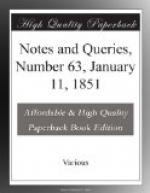Cooper, in his Raven’s Nest, makes Mr. Aristobulus Brag use the provincialism “I swanny;” “by which,” observes the author, “I suppose he meant—I swear!” Of course, this has nothing to do with swearing by swans, more than sounding like it; argument of sound being very different from sound argument. Mr. Cooper does not seem to have given a thought to the analysis of the phrase, which is no oath, merely an innocent asseveration. “I’s-a-warrant-ye” (perhaps when resolved to its ungrammatical elements, “I is a warranty to ye”) proceeds through “I’s-a-warnd-ye,” “I’s-warn-ye” (all English provincialisms,) to its remote transatlantic ultimatum of debasement in “I swanny.”
G.J. CAYLEY.
Mildew in Books (Vol. ii., p. 103).—In reply to B., who inquires for a prevention for mildew in books, I send the following receipt, which I have copied from a book containing many others:—“Take a feather dipt in spirits of wine, and lightly wash over the backs and covers. To prevent mould, put a little into writing ink.”
Another to take mildew out of linen.—“Mix powdered starch and soft soap with half the quantity of bay salt; mix it with vinegar, and lay it on both sides with a painter’s brush. Then let it lie in the open air till the spots are out.”
J.R.
“Swinging Tureen,” (Vol. i., pp. 246. 307. 406.).—
“Next crowne the bowle
full
With gentle lamb’s-wooll
Adde sugar, nutmeg, and ginger,
With store of ale too;
And thus must ye doe
To make the wassaile a swinger.”
Herrick, cited in Ellis’ Brand, ed. 1849, vol. i. p. 26.
By the way, is not the “lanycoll” (so called, I presume, from the froth like wool (lana) at the neck (collum) of the vessel), mentioned in the old ballad of “King Edward and the Shepherd” (Hartshorne’s Met. Tales, p. 54.), the same beverage as “lamb’s-wool?”
H.G.T.
Totness Church (Vol. ii., pp. 376. 452.).—My thanks are due to your correspondent S.S.S. for kindly furnishing information as to the singular arched passage mentioned in a former note, which drew my attention as a casual visitor, and which {30} certainly appears to be the “iter processionale” referred to in the will of William Ryder. Any information as to the subject of the good woman’s tradition would be very acceptable. Perhaps S.S.S. will allow me, in return for his satisfactory explanation of the “dark passage” in question, to over a very luminous passage in confirmation of his view of Goldsmith’s.
H.G.T.
Lights on the Altar (Vol. ii., p. 495.).—In the 42nd canon of those enacted under King Edgar (Thorpe’s Ancient Laws and Institutes of England, vol. ii. pp. 252-3.) we find:—
“Let there be always
burning lights in the church when mass is
singing.”




